

Let's Celebrate... ‘Through a glass darkly’ Part 1: Can OER lead to educators’ critical reflection and improved practice? Photo: camil tulcan I’ve been reflecting on reflection of late… Reflection is the focus of OER Research Hub Hypothesis E: Use of OER leads to critical reflection by educators, with evidence of improvement in their practice.

We’re researching this hypothesis with several collaborating projects, including TESS India, CCCOER and the Flipped Learning Network. In recent team discussions we’ve begun to explore our own notions of what ‘critical reflection’ might comprise and just how OER might impact on educators’ practice via a process of critical reflection.
So, this seems a timely moment to consider a few of the theoretical perspectives on the topic. Procee (2006) gives a telling insight into the reflection-related theoretical landscape when commenting that: Reflection in education is a field full of promises: promises for improving professional proficiency, for fostering personal growth, and for increasing social justice. Procee’s Dimensions of Reflection model References Dewey, John (1933). Challenges. Characteristics and roles. NCSL Modular Curriculum. Home. Af0eab12-c2ce-4d2c-b1a0-59b795415437. Criticism. Major contributions and quotations. Jtevol01no01january200358-63.
10 ways. Jack Mezirow and Transformational Learning Theory. Jack Mezirow Transformational Learning by Sunny Cooper, M.S., M.Ed.
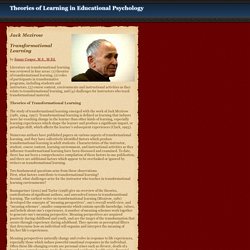
The%20Evolution%20of%20John%20Mezirow's%20Transformative%20Learning%20Theory. Mezirow's Ten Phases of Transformative Learning - Transformative Learning. The Transformative Learning Theory was first articulated by Jack Mezirow of Columbia University after researching factors related to the success, or lack of, of womens’ reentry to community college programs in the 1970's, with the resulting conclusion that a key factor was perspective transformation .
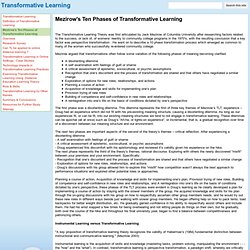
He went on to describe a 10 phase transformation process which emerged as common to many of the women who successfully re-entered community college. Mezirow argued that transformations often follow some variation of the following phases of meaning becoming clarified: The first phase was a disorienting dilemma. This dilemma represents the first of three key themes of Mezirow’s TLT, experience – Doug had an experience which did not fit with his pre-existing meaning structure, causing a disorienting dilemma. As long as our experiences fit, or can be fit, into our existing meaning structures we tend to not engage in transformative learning. Transformative Learning Theory - An Overview. Transformative learning. Transformative learning theory says that the process of "perspective transformation" has three dimensions: psychological (changes in understanding of the self), convictional (revision of belief systems), and behavioral (changes in lifestyle).[1] Transformative learning is the expansion of consciousness through the transformation of basic worldview and specific capacities of the self; transformative learning is facilitated through consciously directed processes such as appreciatively accessing and receiving the symbolic contents of the unconscious and critically analyzing underlying premises.[2] A defining condition of being human is that we have to understand the meaning of our experience.
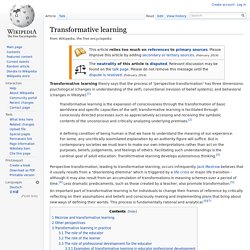
For some, any uncritically assimilated explanation by an authority figure will suffice. But in contemporary societies we must learn to make our own interpretations rather than act on the purposes, beliefs, judgements, and feelings of others. Blooms-taxonomy-revised2. Learn-unlearn. Mezirow. Jack Mezirow - Transformational Learning. Congreso Puertorriqueño de Investigación en la Educación. 11, 12 y 13 de marzo de 2009 A Reflection on Transformative Learning in a Professional Development Context Dra.
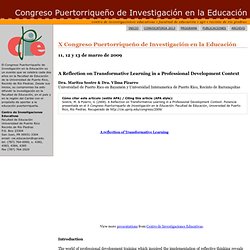
Maritza Sostre & Dra. Vilma PizarroUniversidad de Puerto Rico en Bayamón y Universidad Interamerica de Puerto Rico, Recinto de Barranquitas Cómo citar este artículo (estilo APA) / Citing this article (APA style):Sostre, M. & Pizarro, V. (2009). Introduction The world of professional development training which inspired the implementation of reflective thinking reveals that when English language teachers come together in a professional development activity, the synergy created enhances their abilities to revitalize and transform their teaching practices.
Wrap Up Webinar Presentation - Jack Mezirow. Transformational Learning Theory. A Missing Dimension – Getting Ready for Transformative Learning In their chapter in Mezirow and Associates' book, Learning as Transformation (2000), Mary Field Belenky and Ann v.
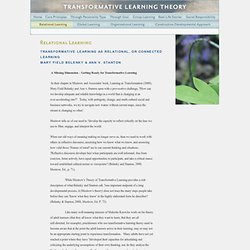
Stanton open with a provocative challenge, ? How can we develop adequate and reliable knowledge in a world that is changing at an ever-accelerating rate?? Today, with ambiguity, change, and multi-cultural social and business networks, we try to navigate new waters without current maps, since the stream is changing so often!
Transformative Learning Theory is an adult education based theor. Transformational Learning Theory. Introduction to Transformative Learning - Transformative Learning is a theory of deep learning that goes beyond just content knowledge acquisition, or learning equations, memorizing tax codes or learning historical facts and data.
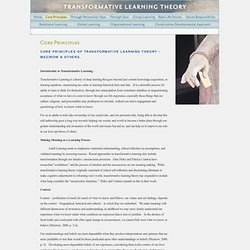
It is a desirable process for adults to learn to think for themselves, through true emancipation from sometimes mindless or unquestioning acceptance of what we have to come to know through our life experience, especially those things that our culture, religions, and personalities may predispose us towards, without our active engagement and questioning of how we know what we know. For us as adults to truly take ownership of our social roles, and our personal roles, being able to develop this self-authorship goes a long way towards helping our society and world to become a better place through our greater understanding and awareness of the world and issues beyond us, and can help us to improve our role in our lives and those of others.
Context 2000, p.4). Sources: